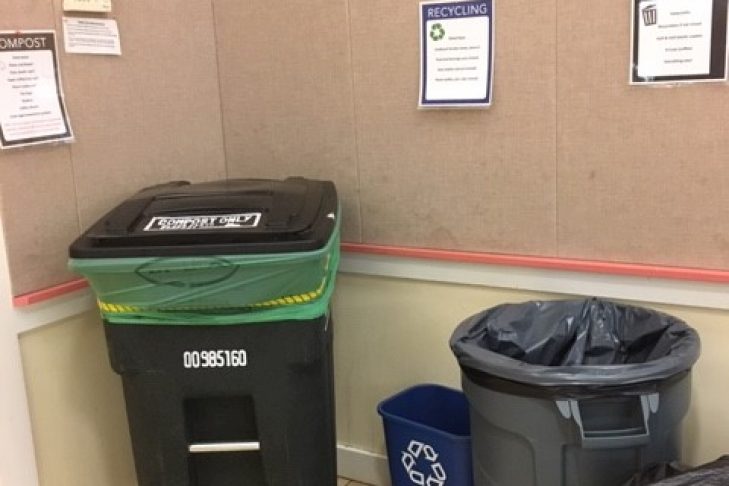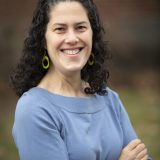Starting in May 2019, Brookline synagogue Temple Beth Zion, a longtime Beantown Jewish Gardens (BJG) partner, is sending nearly all waste from Shabbat Kiddush and other events to the compost pile instead of the landfill. The TBZ compost committee has located and implemented usage of compostable alternatives to the previously used plastic and paper flatware and dish ware. The only disposable item used at Kiddush that cannot go in the compost bin is the plastic tablecloth, for which a suitable alternative (at the right price) has not yet been found. And without a dishwasher in the kitchen, a way to avoid using disposables entirely has not been found.
TBZ’s mission includes commitment to, “Joyful participatory worship, meaningful Jewish learning, spiritual growth and acts of social justice.” Their dedication to social justice includes sponsorship of the first Boston Jewish Food Conference in April 2012. Their focus on action is evident in their Mishpachot (family programming), which worked with BJG to celebrate Sukkot on a farm as early as 2013.
According to member Jonathan Klein, one of those who spearheaded the effort to begin composting, there had been great interest in the community for many years regarding figuring out a way to reduce the amount of waste generated at Kiddush. Recently, two key elements have made it a viable option. First, non-food waste (paper and quasi-plastic products) have become more feasible to compost in recent years. Now, cleaning up after Kiddush is super simple, as (nearly) everything can go into a single receptacle. Second, the increased availability of commercial pick-up of all compostable waste allows for a more straightforward and simple arrangement. The food scrap collection market has become competitive as more pick-up options have become available. It is not feasible for the TBZ community to maintain its own compost pile in the urban environment where the synagogue is located, although the idea was floated many times.
The new system has been enthusiastically and successfully adopted by TBZ congregants. Some people need to be educated/reminded on what can go in the compost bin if they are not familiar with compostable dish ware or just not used to composting in general, but thanks to Klein and others, people act as monitors and provide gentle reminders as necessary. As much as can be is diverted from the landfill and sent to be composted instead. Rabbi Claudia Kreiman’s active involvement and announcements from the bimah and at every Kiddush have also greatly increased visibility and awareness.
TBZ joins other area synagogues in considering how best to divert their trash from the waste stream. Congregation Shaarei Tefillah, Temple Emunah in Lexington and Temple Reyim (to name a few) have a regular compost pick-up. Temple Israel Boston and Temple B’nai Abraham in Beverly have both worked hard to reduce their use of disposables, and will compost at some events.
TBZ continues to seek ways to be more earth-friendly and action-oriented. Another recent decision was the installation in June of solar panels, which are expected to significantly cut TBZ’s carbon footprint. You can join them on Sunday, Sept. 15, from 10:30-12:30 to celebrate.
This post has been contributed by a third party. The opinions, facts and any media content are presented solely by the author, and JewishBoston assumes no responsibility for them. Want to add your voice to the conversation? Publish your own post here. MORE



